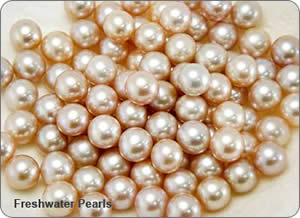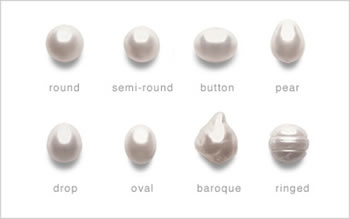Difference between Freshwater and Saltwater Pearls
Key Difference: Freshwater pearls are grown in mussels that live in saline free water such as lakes and rivers. Saltwater pearls are grown in oysters in saline water such as oceans and seas.
 Pearls are considered an interesting rarity in the world of jewels, as it is produced in a different manner from other stones. While other stones are produced in the depths of the earth, in dark and damp caves; pearls are produced in the depths of the oceans and can only be produced under certain circumstances.
Pearls are considered an interesting rarity in the world of jewels, as it is produced in a different manner from other stones. While other stones are produced in the depths of the earth, in dark and damp caves; pearls are produced in the depths of the oceans and can only be produced under certain circumstances.
Pearls are composed of calcium carbonate in minute crystalline form, similar to the shell of a clam. The calcium carbonate is created in the shell of a living shelled mollusk. Formation of pearls is a rather interesting process, which occurs in clams and oysters. When a foreign particle enters the clam or oyster shell, a defense mechanism kicks in and the mollusk starts coating the particle with layers and layers of nacre, also known as mother-of-pearl. The continuous layer after layer forms a thick coat around that particle, resulting in the formation of the pearl. Pearls are generally round in shape, although they can also come in other shapes such as Baroque pearls. These days pearl mining has become a costly venture and now many people are creating pearls by creating the right circumstances.
Pearls can now be classified among two major groups: natural pearls and cultured pearls. Natural pearls are pearls that occur in the nature, where no human manipulation takes place. These are costlier in nature as they are not created in labs or controlled settings. Cultured pearls are grown in pearl farms, where humans create the right circumstances in which he pearl will grow. They manipulate the settings and decide factors such as: depth of the nacre coating, the type of water that the mollusk lives in, how long the pearl is left in the place before it is harvested, etc.

The cultivation of pearls results in two different factors that come into play: freshwater and saltwater. The main difference, as the name suggests in the type of water that is used in which the mollusk resides during the period of growth of the pearl. Another difference lies in the type of mollusk used; freshwater pearls are cultured in mussels, while saltwater pearls are grown in oysters. The shape of the pearl also differs in saltwater and freshwater, the saltwater pearls are proper round in shape, while freshwater pearls can range in shapes. Freshwater pearls can also come in various colors, while saltwater pearls are more commonly white and off white, with overtones of gold or silver. However, with the pearl farms, even saltwater pearls can come in various colors, including black, gold and colorful.
People often believe that freshwater pearls are not real and are artificial but they are just as real as saltwater pearls. The prices for the pearls different based on properties such as shape, color, size and luster. Natural pearls are often more expensive than any of the cultured ones and are also quite rare.
Comparison between Freshwater and Saltwater Pearls:
|
|
Freshwater Pearls |
Saltwater Pearls |
|
Type of water |
Fresh, saline free water |
Saline water |
|
Bodies of water |
Lakes, rivers, streams |
Oceans and seas |
|
Type of mollusk |
Mussels |
Oysters |
|
Shapes |
Round, Oval |
Round, lumpy, natural looking, baroque, drop |
|
Price |
Cheaper compared to saltwater pearls |
More expensive because of their larger size and more luster |
|
Colors |
White, cream, pink, lavender, and copper |
Cream and white |
|
Number of pearls produced at one time |
Can be up to 50 pearls |
Can produce between 1-3 |
|
Time |
4-6 years |
6 to 18 months |
|
Nacre layer |
Thicker layer of nacre |
Thinner layer of nacre |
|
Luster |
Less lustrous |
More lustrous |
|
Size |
Less than 7mm |
Can be more than 7mm and tend to be bigger in size |
Image Courtesy: majesticpearl.com, ecoopulence.com









Add new comment